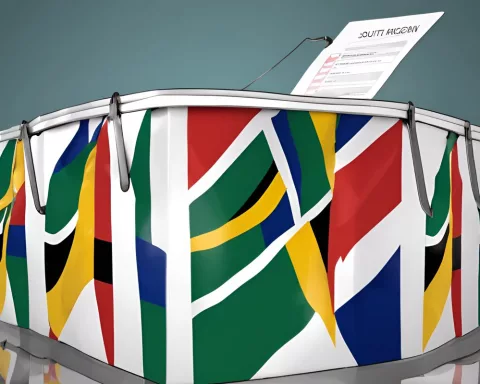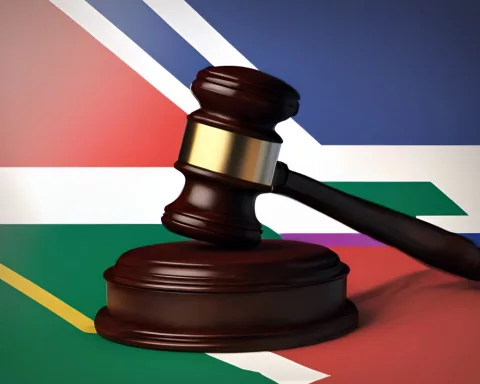In December 2023, an important event took place in South Africa’s National Assembly that tested the concept of parliamentary accountability. During the State of the Nation Address, some assembly members disregarded the authority of the Presiding Officer and were found guilty of contempt of Parliament. The Joint Rules Committee recommended penalties including a thirty-day suspension without pay, which was overwhelmingly approved by the House. This incident serves as a reminder that the National Assembly upholds democratic values and demands accountability and respect for parliamentary proceedings.
What happened during the 2023 State of the Nation Address in South Africa’s National Assembly?
During the 2023 State of the Nation Address in South Africa’s National Assembly, some assembly members disregarded the authority of the Presiding Officer. Despite his insistence, their demand to vacate the Chamber was ignored. The members who were the focus of this controversy were found guilty of contempt of Parliament and were subjected to a suspension without pay for thirty days. This incident serves as an important lesson that no act of disrespect or defiance will be tolerated in the National Assembly.
A Pivotal Moment in History
On December 6, 2023, under the grandiose arches of the South African [National Assembly](https://capetown.today/unveiling-the-national-assembly-fusion-of-morality-civic-participation-and-advocacy/), an event of historical significance took place. The assembly, one of the nation’s most revered democratic institutions, was the backdrop to a high-stakes confrontation that hinged on the concept of parliamentary accountability. The issue at hand was the adoption of a report from the Powers and Privileges Committee that dealt with allegations of contempt of Parliament. The implications were far-reaching and the persons involved were of vital significance.
These allegations had their roots in the 2023 State of the Nation Address. It was alleged that during this event, the sacred process of parliamentary proceedings was violated. A specific incident was highlighted, where some assembly members disregarded the authority of the Presiding Officer. They not only disrespected him but also caused considerable disturbance. Despite the Presiding Officer’s insistence, his demand for these members to vacate the Chamber was ignored.
The members who were the focus of this controversy were influential figures of the Assembly. They were Mr J S Malema, Mr N F Shivambu, Mr M Dlamini, Dr N Q Ndlozi, Mr S Tambo, and Mr V Pambo. Instead of following the orders, they heightened the tension by moving towards the stage where the Presiding Officers and the President were seated.
The Investigation and Verdict
The intransigence of these members did not go unnoticed. The Speaker and the Chairperson of the National Council of Provinces invoked Joint Rule 14GA. This incident was referred to the Joint Rules Committee on 10 February 2023. As per this rule, a multi-party committee is commissioned to investigate the circumstances leading to the physical expulsion of a member from the Chamber.
Accused of contempt of Parliament, the members were subjected to a rigorous investigation. Following detailed discussions and a careful review of the evidence, the committee found all the accused members guilty. The verdict resonated through the corridors of the Parliament, serving as a bold reminder of the sacrosanctity of parliamentary etiquette.
The committee, however, did not limit itself to just pronouncing the members guilty. It recommended firm penalties to the National Assembly. There were two primary sanctions suggested. Firstly, a public apology in the House to the President, the Speaker, and the people of South Africa, as per section 12(5)(c) of the Act. Secondly, a suspension without pay for thirty days, regardless of whether the House or any of its committees had meetings scheduled during that period. The suspension was scheduled from February 1 to February 29, 2024, as outlined in section 12(5)(g) read alongside section 12(9) of the Act.
The Judgement and Its Impact
The House reviewed the report and overwhelmingly approved it with 264 votes in its favor, against a mere 30. This resounding acceptance of the report demonstrated the National Assembly’s steadfast commitment to uphold the principles of parliamentary dignity and respect for the Office of the Presiding Officers.
This incident serves as an important lesson, not only for the members involved but for the entire nation. It underscores that the revered Parliament of the Republic of South Africa remains a stronghold of democratic values. It is an institution where no act of disrespect or defiance will be tolerated. It is a place where accountability is not just anticipated but demanded, and the rule of law is held in the highest esteem.
Who were the members involved in the 2023 State of the Nation Address controversy in South Africa’s National Assembly?
The members involved in the 2023 State of the Nation Address controversy in South Africa’s National Assembly were Mr J S Malema, Mr N F Shivambu, Mr M Dlamini, Dr N Q Ndlozi, Mr S Tambo, and Mr V Pambo. They were accused of disregarding the authority of the Presiding Officer and violating the sacred process of parliamentary proceedings.
What were the allegations of contempt of Parliament?
The allegations of contempt of Parliament were based on the incident where some assembly members disregarded the authority of the Presiding Officer during the 2023 State of the Nation Address. They not only disrespected him but also caused considerable disturbance. Despite the Presiding Officer’s insistence, his demand for these members to vacate the Chamber was ignored.
What was the penalty recommended by the Joint Rules Committee for the members found guilty of contempt of Parliament?
The Joint Rules Committee recommended a suspension without pay for thirty days, regardless of whether the House or any of its committees had meetings scheduled during that period. The suspension was scheduled from February 1 to February 29, 2024, as outlined in section 12(5)(g) read alongside section 12(9) of the Act.
What was the impact of the verdict and judgement on the National Assembly?
The verdict and judgement had a significant impact on the National Assembly as it demonstrated the Assembly’s steadfast commitment to uphold the principles of parliamentary dignity and respect for the Office of the Presiding Officers. The resounding acceptance of the report with 264 votes in its favor, against a mere 30, showed that the National Assembly demanded accountability and respect for parliamentary proceedings.
What did the incident serve as a reminder of?
This incident served as a reminder that the National Assembly upholds democratic values and demands accountability and respect for parliamentary proceedings. It underscored that the Parliament of the Republic of South Africa remains a stronghold of democratic values. It is an institution where no act of disrespect or defiance will be tolerated.
What rule was invoked by the Speaker and the Chairperson of the National Council of Provinces in response to the incident?
The Speaker and the Chairperson of the National Council of Provinces invoked Joint Rule 14GA, which commissions a multi-party committee to investigate the circumstances leading to the physical expulsion of a member from the Chamber.












